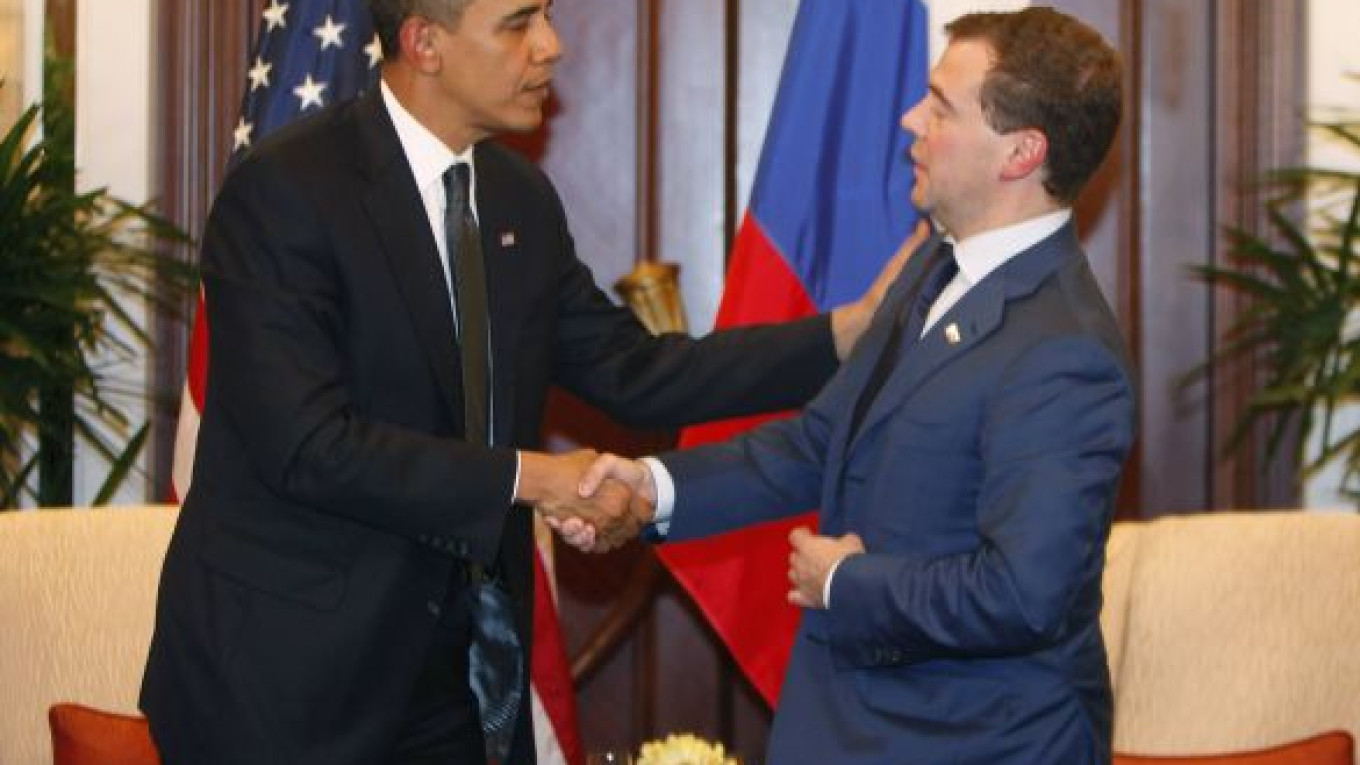SINGAPORE — President Barack Obama said Sunday that the United States and Russia would have a replacement treaty on reducing nuclear arms ready for approval by year’s end.
Obama and President Dmitry Medvedev met on the sidelines of a summit of the Asia-Pacific Economic Cooperation to announce good progress in negotiations on an updated pact to replace the 1991 Strategic Arms Reduction Treaty, or START I, which expires Dec. 5.
Sitting, gesturing and leaning toward Medvedev, Obama said the pair discussed a successor to the treaty and described “excellent progress over the last several months.”
“I’m confident that if we work hard and with a sense of urgency, we’ll be able to get that done,” Obama said, adding that technical issues remain.
Medvedev said he hoped that negotiators would “finalize the text of the document by December.”
Obama and Medvedev agreed in April to reach a new nuclear arms reduction pact to replace and expand upon the one that was signed by former President George H.W. Bush and Soviet leader Mikhail Gorbachev. During a July summit in Moscow, Obama and Medvedev further agreed to cut the number of nuclear warheads that each nation possesses to between 1,500 and 1,675 within seven years.
U.S. officials say the two nations have agreed on the broad outlines of a new treaty, which could be signed during Obama’s travels to Europe in early December to accept the Nobel Peace Prize.
Obama also pushed on Sunday for continued pressure on Iran and its nuclear program. Appearing with Medvedev, Obama said, “We are now running out of time.” “Unfortunately, so far it appears Iran has been unable to say yes” to the proposal on uranium reprocessing, Obama said.
Medvedev continued: “We are prepared to work further, and I hope our joint work will reach a positive result. In case we fail, other options remain on the table.” He has said further sanctions against Iran were possible if it did not open its nuclear program to inspections to prove that it was not trying to build a bomb.
The five permanent members of the United Nations Security Council — Britain, China, France, Russia and the United States — along with Germany have engaged Iran on its nuclear program, most recently with a deal for it to ship enriched uranium to Russia for further processing as fuel for an aging reactor used for medical treatments.
A Message from The Moscow Times:
Dear readers,
We are facing unprecedented challenges. Russia's Prosecutor General's Office has designated The Moscow Times as an "undesirable" organization, criminalizing our work and putting our staff at risk of prosecution. This follows our earlier unjust labeling as a "foreign agent."
These actions are direct attempts to silence independent journalism in Russia. The authorities claim our work "discredits the decisions of the Russian leadership." We see things differently: we strive to provide accurate, unbiased reporting on Russia.
We, the journalists of The Moscow Times, refuse to be silenced. But to continue our work, we need your help.
Your support, no matter how small, makes a world of difference. If you can, please support us monthly starting from just $2. It's quick to set up, and every contribution makes a significant impact.
By supporting The Moscow Times, you're defending open, independent journalism in the face of repression. Thank you for standing with us.
Remind me later.


